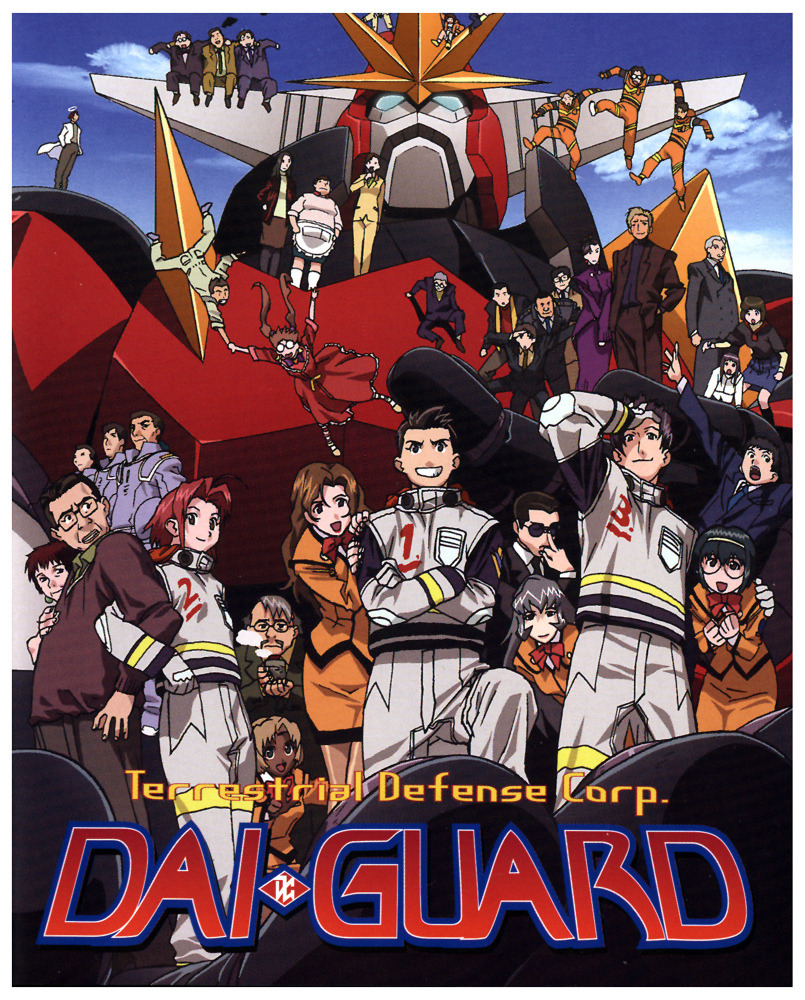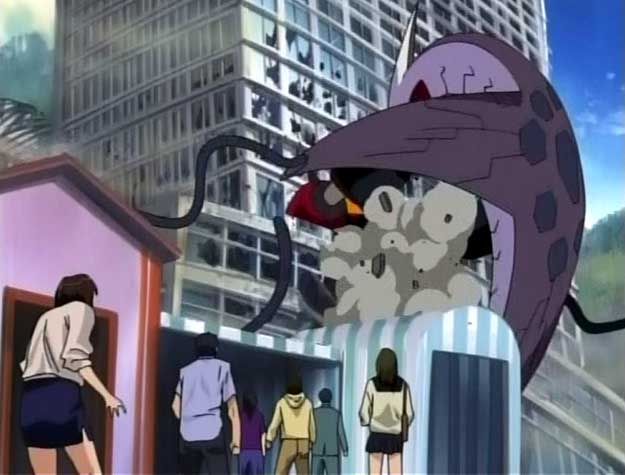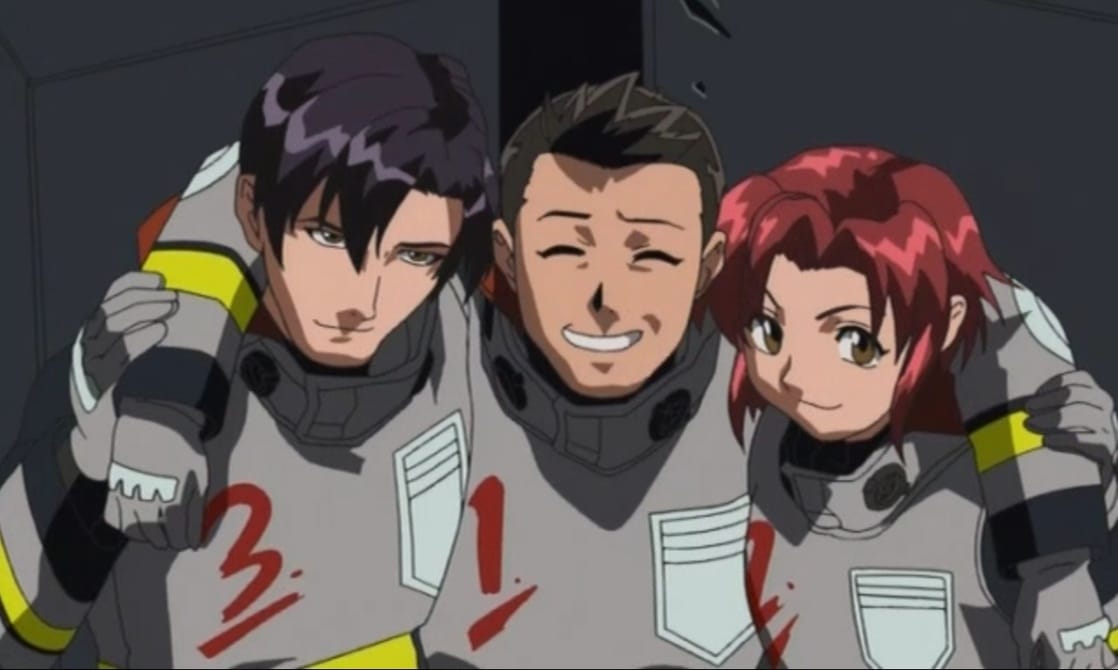 |
| From https://66.media.tumblr.com/38626aab62333c1daaea 809a90513d2c/tumblr_o3ywhvR4ak1rndrbdo2_1280.jpg |
Director: Seiji Mizushima
Screenplay: Fumihiko Shimo
Voice Cast: Akiko Hiramatsu as
Ibuki Momoi; Kentaro Ito as Shunsuke Akagi; Shinichiro Miki as Keiichirou
Aoyama; Chiharu Suzuka as Kamimura; Hiro Yuuki as Yosuke Sumida; Katsuyuki
Konishi as Hirotaka Ijyuin; Kenichi Ono as Agent Shiro Shirota; Makoto Higo as
Tomoru Taguchi; Marina Ono as Chiaki Nakahara; Masashi Hirose as Chief Haruo
Osugi; Mayumi Shintani as Rika Domeki; Michiko Neya as Noriko Oyama; Rumi
Kasahara as Shizuka Irie; Shoji Izumi as Tomoyoshi Ishizuka; Takaya Hashi as
Okouchi; Yukari Tamura as Fuuka Tanigawa
Viewed in Japanese with English Subtitles
It immediately caught my interest
as a premise - ordinary salary employees having to operate a giant robot, with
all the concerns of protecting Tokyo from monsters with additional fears of red
tape superseding everything. The further surprise was to discover the director
of the series is Seiji Mizushima, he
who would helm the 2003 adaptation of Full
Metal Alchemist that become a monster hit in the West and the East. He is
not a figure I have heard in a form of auteur status, a working director to
this day who other most prominent role was helming Mobile Suit Gundam 00 (2007-2009), so it was inherently fascinating
to see this obscure title from the perspective of where, a few years later,
he'd acquire a monumental hit under his belt.
Dai-Guard is a giant robot that, being built to fight natural
phenomenon called Heterodynes, was never deployed when they first appeared in
20181, twelve years later reduced to a mascot item for its owner and
creator the 21st Century Defense Security Corporation, who developed the
machine for the military but have now used it as an attraction to make up for
the cost of building the machine. A Heterodyne, later in the series found to be
created through earthquakes and tremors in fault lines, makes an appearance for
the first time for so long and, in the chaos, an overeager salary man working
for the corporation's group managing the machine, Public Relations Division 2,
hastily gets into the "Dai-Guard". Said man, the headstrong Shunsuke
Akagi, is tagged along with meek ladies man co-worker Keiichiro Aoyama, and
their strong minded senior female co-worker Ibuki Momoi, and they manage to
succeed in spite of the piss and venom upper management have immediately
afterwards.
From there the show never
becomes, until the last few episodes, a traditional giant robot show where
you'd presume they would eventually fight escalating monsters and find the cause;
the former happens, but a lot of the series tone is very down-to-earth, the
story instead the lives of the three and their sector Public Relations Division
2 caught between political shenanigans with senior management and the military,
a army officer Shirou Shirota assigned
to their office to improve them but with always the potential of them being
replaced with the military who find their existence one with contempt.
Their own inexperience, the
military, both Shirota being the tough military figure who becomes their de
facto senior, and attempts to replace them with direct military control, is a
lot of the narrative as a result, not exactly Salaryman Kintaro, a 2001 anime adaptation where a former motorbike
gang leader brings his burning passion to the world of construction company and
business melodrama, but thankfully Dai-Guard
plays with the banality of the work, the long hours and paper work having to be
rewritten because there are too many onomatopoeias in Shunsuke's reports to
describe battles, a humble vision of this story. There is not a lot of
spectacle as a result, despite a background of a major tragedy a decade or so
earlier, for the most part of a small scale narrative instead. The Heterodynes
aren't even sentient or even revealed to be of a greater threat, but a once
unnatural phenomenon which has become a natural occurrence Public Relations
Division 2 has to deal with alongside the likes of the military.
This is so much to the point I
suspect Dai-Guard was actually a
giant metaphor for Japan's history of natural disasters, pertinent as among its
many motifs is a lot of sequences of the cast involved or helping with
emergency shelters where the ordinary populous are afraid or in need of help in
the midst of this chaos whenever it occurs. Throughout the series, emphasis is
made on the moments as much before and after these incidents of Heterodyne
attack, even the false alarms where Dai-Guard staff are stuck having to waste
hours on stand-by part of a few episodes. Even when the show is frankly
predictable, the plot trajectory going to its natural course for optimism, it
proves a virtue whether the threat to the main characters are real or minimal
that the circumstances around these incidents are the actual dramatic concern
instead.
 |
| From https://www.clubdesmonstres.com/best /img/rayheterodynedaiguard10.jpg |
Beyond this, the show is very simplistic and very family friendly, right down to the Q figure behind the robot's gadgets being an eccentric female teenage prodigy in exaggerated costume, so there's not a lot of necessary greater psychological depth barring one character, Ibuki Momoi. It is interesting that a major narrative threat for a few episodes is devoted to her - it unfortunately means that, as the main female character, she is the only figure to buckle under pressure behind the cockpit at some point, but that's not the fault of the show in the slightest, where her drama is actually quite an interesting and admirable direction, just an bad luck in terms of accidentally falling into the trope of only female characters having the psychological baggage of the anime I have seen recently up to this review. Excised from this context, it's probably one of the most interesting moments in the series how Ibuki's home life is built up and she becomes the most fleshed out character on the main team, whose biological father died in the 2018 incidents and wishing to be involved with the current ones in spite of her turbulent home life living with her mother and step father. Even the mild mannered way it concludes is actually a virtue alongside the fact she even has this unlike anyone else, merely a surprise that the show goes this way. More as the show's only moment of complexity is found in who is ostensibly the tough woman, a senior staff member but younger than the trio who gets to be to have the exaggerated moments of anger, (especially when sleep deprived), at Shunsuke Akagi being an idiot.
In terms of production, Dai-Guard was made in 1999 just as the
transfer from hand drawn to digitally painted animation cells was taking place;
thankfully, there are no glaring moments of anything looking obsolete, but it's
a modest production which doesn't really stand out artistically. In its favour,
barring the giant robot and monsters, the very low key tone is absolutely
appropriate in the naturalism. Even in this world, where you have a super robot
who acquires a drill attack halfway through, the rest of the show plays off
with humour and a gentleness emphasised by the end credits, snapshots of life
of these characters that could be from a slice of life show with a pop ballad about
hurtling forward in life2. It does contrast to Full Metal Alchemist greatly as that was clearly a major production
that, over fifty plus episodes even with an abrupt ending, worked a lot to
cater to a lot of audiences, whilst there's something even more charming in how
sedate and mostly on a limited scale this earlier series is. A great example of
this is the story arch in the snow covered city of Sapporo, Hokkaido that, even
if it deals with a intercontinental tension with a neighbouring country, is
still just the everyday life of the group sent there merely as a public
exhibition alongside an ice carving festival and have themselves dealing with a
Heterodyne that is difficult because it just happens to float in the air out of
their robot's reach.
In fact probably the best episode
of the whole show has no robot scenes at all, only the off day of the staff where
two female co-workers, among a memorable cast of lovable figures in the office,
try to create a documentary about why the Das-Guard exists, leading to a
literal art film within the show where the ordinary life of Tokyo is enough to
answer the question. Only the sense the ending is going to be obvious, with
time running out and somewhat dampening the experience with its predictability,
undercuts a surprisingly sweet and fascinating series lost in the annuals of
early ADV Films releases3.
Released very early in their DVD output for the UK from the copies I acquired,
its existence for the director before he made Full Metal Alchemist is interesting in terms of comparison. The
broad humour is shared between them, but in terms of comparison, there's a real
surprise to be watching this very sedate show, one which begins the opening
credits with a mock warning, though written as advice, to sit away from the
television to not hurt one's eyes as a viewer. That sense of playfulness and
calm for a giant robot show, alongside its interest tangents into business
politics being a factor on the drama, is something to appreciate.
 |
| From https://ilarge.lisimg.com/image/5412141/ 1118full-dai--guard-screenshot.jpg |
========
1) Yes, it's just become
alternative reality, though for all we know one of the giant replica Gundam robots that are sometimes
unveiled in Japan is actually operational...
2) Speaking of music, its curious
how Kenji Kawai co-write the score
for this series and Yoko Kanno helped
on composing one of the songs, two very significant figures in their own rights
in anime music and composition on this relatively obscure title.
3) It has, however, been included in the Super
Robot Wars videogame franchise, an ongoing series that (unless it's the
versions with original characters) has been able for Japanese anime fans to
cross over robots from numerous franchises, from even major titles like Neon Genesis Evangelion (1995) to
obscure cult choices like this. Hence, someone clearly loves this show and
wants to keep its reputation up.
No comments:
Post a Comment